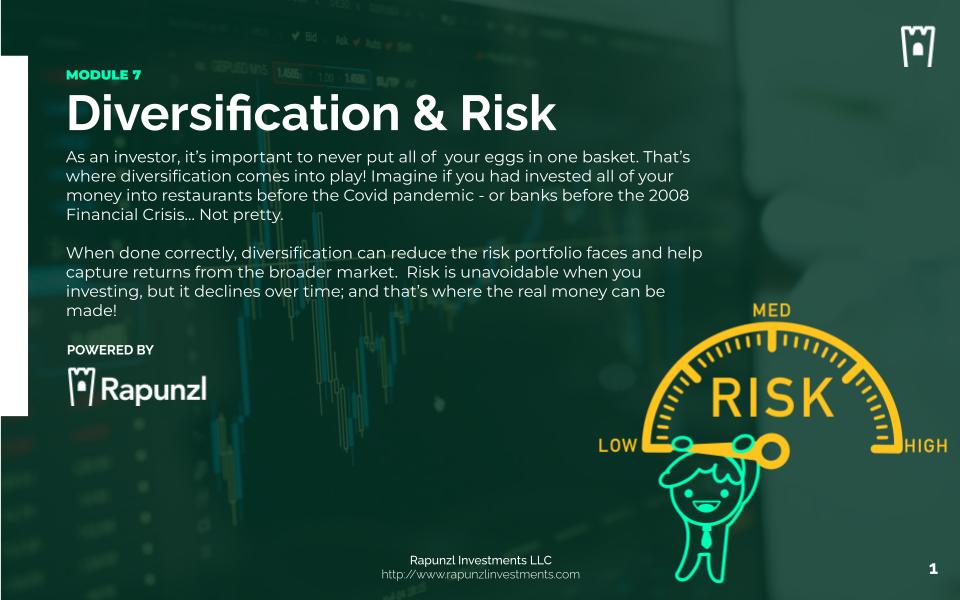
Module 7
Diversification & Risk
Imagine if you had invested all of your money into restaurants before the Covid pandemic - not pretty. When done correctly, diversification can reduce the risk portfolio faces and help capture returns from the broader market.
Risk is unavoidable when you investing, but it declines over time, and that’s where the real money can be made!
Module At A Glance
Grade Levels:
7th - 12th
Est. Length:
3-5 Hours (18 slides)
Activities:
7 Activites
Articles:
6 Articles
Languages:
English & Spanish
Curriculum Fit:
Math, Business, Economics, CTE, Social Studies
Standards Alignment:
CEE National Standards, Jump$tart National Standards & Relevant State Standards

Guiding Questions
- What are the different types of risk?
- How can risk be mitigated through time and/or diversification?
- What does diversification mean when it comes to investing?
- What does the acronym FETCH stand for?
- What does dollar-averaging mean?
- What other investments are there other than the stock market?
- How should you allocate your investments?
Enduring Understandings
- Everyone has a different risk profile that they are comfortable with.
- It is important to figure out how much risk you personally are comfortable with before investing.
- Investing in different companies and asset classes can reduce a lot of risks but never eliminate all of them.
- FETCH stands for Finance, Energy, Technology, Communications, and Healthcare, representing 5 core industries.
- Deciding on an investment strategy and researching before investing can save you a lot of trouble – and money - in the future.
Module Vocab & Key Topics
Diversification
The process of spreading investments across multiple asset classes and markets to reduce the risk of loss. It helps to reduce the volatility of portfolio returns, as well as the potential for high losses due to over-concentration in any one particular asset class or market.
Risk Tolerance
An individual’s capacity for enduring the fluctuations and losses that accompany investing in different asset classes and markets. Generally speaking, a higher risk tolerance means that an investor is more willing to accept greater risks for greater potential rewards.
Risk/Reward Ratio
A measure of how much reward comes with risk. This ratio of potential return versus risk is an important metric used by investors when determining which investments to make.
Leverage
The ability to control more money in investments than you have in capital; this can increase both profits and losses depending on how it is used and how successful an investment strategy becomes.
Margin Trading
Taking out loans from brokers to fund investments; this increases leverage and can result in greater profits, but also greater losses if markets turn against the investor.
Hedge Funds
Investment funds that use alternative strategies such as leverage, futures, and options to make money from different kinds of investments including commodities trading.
Hedging
Making sure an investment is protected from any negative changes in market movements by using derivative instruments such as futures and options contracts; this helps mitigate risk from investments and reduce losses during times of uncertainty in markets.
Asset Correlation
A measure of how two assets move in relation to each other; if their correlation is high then they will generally move together; if their correlation is low then they will generally move independently or even in opposite directions. Asset correlation plays an important role in portfolio diversification as it allows investors to identify assets that may be uncorrelated or even negatively correlated so as to reduce overall portfolio volatility levels.
Portfolio Allocation
The process of selecting and allocating funds across different asset classes and markets in order to achieve a desired level of diversification and risk/reward ratio. Portfolio allocation can be done manually or with automated tools that take into account your personal goals, preferences, and risk tolerance.
Rebalancing
The process of periodically re-allocating funds from certain assets or markets where performance has been strong back into those where performance has been weak so as to maintain desired levels of diversification and risk/return ratios across an entire portfolio on an ongoing basis.
Modern Portfolio Theory (MPT)
A theory proposed by economist Harry Markowitz that suggests diversifying investments across different asset classes can maximize returns while minimizing associated risks. MPT also postulates that investors can use mathematical formulas to determine optimal portfolios based on expected rates of return, volatility levels, correlation between assets, and other factors.
Futures Contract
An agreement to buy or sell a specified amount of a commodity at a predetermined price on a future date; this contract is typically traded on the commodities market.
Commodity Market
A marketplace where commodities (such as crude oil, gold, or silver) are traded for cash or other commodities.
Basis Trading
Buying and selling different types of commodities based on their differences between spot prices and futures prices; basis traders seek to take advantage of price discrepancies between different contracts on the same underlying asset to make profits without taking ownership of the asset itself.
Options Contracts
Derivative financial instruments that give buyers the right (but not the obligation) to buy or sell an underlying asset at a predetermined price before expiration date; these are typically used by sophisticated investors seeking to maximize profits while mitigating risk exposure over time periods with high volatility such as near expiry dates for futures contracts when prices can change quickly within short periods of time due to news events or shifts in demand/supply dynamics affecting those assets over short-term windows like weeks or days instead of months or years (which is more typical for long-term investing).










